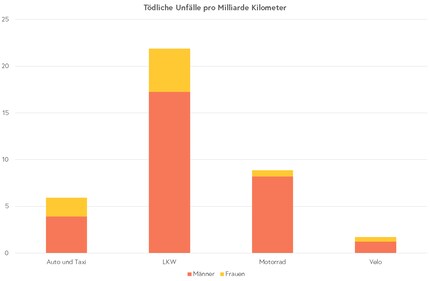
Background information
Starting at 45, men often face serious health risks
by Martin Jungfer

When men drive, they are twice as dangerous for other road users as women. The situation is even more extreme with other modes of transport.
Normally, road accident statistics look at how great the risk to one's own life is. However, researchers have now analysed how high the risk to others is. The results show that, calculated on a statistical average, men behind the wheel pose a significantly greater risk to others than women.
This is the result of a study for which scientists led by Rachel Aldred from the University of Westminster in London analysed various British accident statistics from 2005 to 2015. For example, the risk of being killed by a male driver is around twice as high as the risk of being killed by a female driver. In their article in the specialist journal "Injury Prevention", the researchers break down the data in detail. Accidents involving men as drivers cost the lives of 3.93 people per billion kilometres driven, compared to only 2.01 accident victims where women are behind the wheel.
These differences are even more pronounced for motorbikes: Here, the ratio is 8.18 deaths for every billion kilometres driven by men to 0.68 deaths per billion kilometres driven by women. The gender difference is most pronounced for lorries with 17.25 deaths versus 4.64 deaths. As significantly more men ride motorbikes and lorries, both modes of transport are also more dangerous overall than cars, for example.

The mode of transport that causes the fewest fatalities on the roads is the bicycle. On average, only one person dies per billion kilometres. However, there is also a significant gender difference on the saddle. On average, men on bikes cause 1.24 fatalities per billion kilometres, women less than half as many at 0.48.
There is disagreement among experts about the reasons for the higher risk potential of men in road traffic. It is assumed that men tend to take higher risks, the scientists write. However, how this affects everyday life and in which situations it actually leads to more fatal accidents is a matter of debate.
We are partners of Spektrum der Wissenschaft and want to make well-founded information more accessible to you. Follow Spektrum der Wissenschaft if you like the articles.
[[small:]]
Experts from science and research report on the latest findings in their fields – competent, authentic and comprehensible.
Interesting facts about products, behind-the-scenes looks at manufacturers and deep-dives on interesting people.
Show all
Background information
by Martin Jungfer

Background information
by Olivia Leimpeters-Leth

Background information
by Patrick Vogt